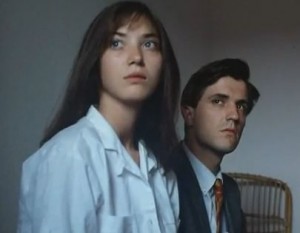STUDIO: Cohen Media Group | DIRECTOR: Jean-Luc Godard | CAST: Myriem Roussel, Thierry Rode, Philippe Lacoste, Juliette Binoche, Johan Leysen
RELEASE DATE: 1/7/14 | PRICE: DVD $29.98, Blu-ray $39.98
BONUSES: New interviews with Myriem Roussel, biographer Antoine de Baecque, and Godard collaborator Pierre Rissient; Godard video “Notes on Hail Mary”; audio commentary by filmmaker Hal Hartley and Museum of the Moving Image chief curator David Schwartz
SPECS: NR | 108 min. | Foreign language drama | 1:33 widescreen | Dolby Digital 2.0 | French with English subtitles
RATINGS (out of 5 dishes): Movie
| Audio
| Video
| Overall
Upon its U.S. release in 1985, Hail Mary, a dense and brilliant modern-dress retelling of the virgin birth of Christ, was protested by militant Catholics, who felt it was blasphemous and obscene. Now that the controversy has disappeared, viewers can evaluate the film on its own merits and discuss the unusually bold experimentation by its director, the legendary Jean-Luc Godard (Weekend).
The film’s plot flirts with blasphemy by imposing contemporary reality on the familiar story: Mary (Myriem Roussel) is a student who plays basketball, while Joseph (Thierry Rode) is her cabbie boyfriend, skeptical about her pregnancy since she maintains she is a virgin. Trying to convince both of them that the pregnancy is divine are the Angel Gabriel (Philippe Lacoste), depicted as a hothead who is willing to beat up Joseph to make his message understood, and his sidekick, a little girl (Manon Andersen). A subplot that never quite takes off concerns a teacher (Johan Leysen) who is romantically involved with one of his students (Anne Gautier) — perhaps a metaphor for the director and his star, if one considers the information about the relationship between Godard and Roussel supplied in the supplements.
Hail Mary is a somewhat uneven work, but when it succeeds —as in the sequences chronicling Mary and Joseph’s relationship, and in the uncanny interlude where Mary “receives” the Holy Spirit — it ranks with Godard’s best work of the Eighties (the decade in which he again assumed the mantle of world-class filmmaker).
He enjoys confounding viewers’ expectations, and the most unusual step he took here was to graft “The Book of Marie,” a short by his longtime filmmaking partner and lady love Anne-Marie Mieville, onto the beginning of Hail Mary. The two films contain credits sequences that separate them, but their visual styles are similar and the fact that both protagonists are named “Marie” may lead viewers to expect the lead from the short (a little girl whose parents are separating) to show up in the feature that follows. (Spoiler alert: she doesn’t.)
The supplements included in this package shed much light on the film’s themes and approach, and its place in Godard’s career. The single most enlightening is a 2010 interview with Roussel, who openly admits that she had an intimate working and personal relationship with Godard prior to the film shoot. She details how a father-daughter love story Godard was developing with her was dropped and Hail Mary became their next collaboration. (Roussel appeared in small roles in JLG’s preceding films Passion and First Name Carmen.)
She notes that she is extremely grateful for having been mentored by Godard and tells the single funniest anecdote in the package, recounting the time that he didn’t feel like filming on a winter’s day so he simply flung himself into a lake to effectively stop the shoot then and there.
Cohen has released Hail Mary in conjunction with a later Godard title, For Ever Mozart (1996). Each package contains interviews with Godard’s colleagues, and biographer Antoine de Baecque, shot in 2010 (evidently for French DVD releases). These interviews sometimes don’t relate directly to the film in question, but all of the chats contain interesting anecdotes and insights about Godard.
The interview with de Baecque on this disc is enlightening, in that the biographer deems Hail Mary both a product of, and Godard’s farewell to, his relationship with Roussel. De Baecque goes so far as to indicate that Roussel was in effect the co-creator of the film, given the close degree to which she worked with Godard. He also discusses the protests that greeted the film when it was first shown in France, and the eventual denunciation of it by the Pope.
American protests against the film are brought up in the mellow and informative audio commentary supplied for this release by indie filmmaker emeritus (and diehard Godard fan) Hal Hartley (Trust) and the chief curator of the Museum of the Moving Image, David Schwartz. The pair discuss how the film was the most protested entry in the history of the New York Film Festival and how many of Godard’s works require what Hartley refers to as “200% viewer attention.”
The only supplement included here that was also present on the previous New Yorker DVD release of the film is Godard’s video short “Notes on Hail Mary.” In this visual essay he talks about the book that inspired the film, a psychological study of the Holy Family by French psychoanalyst Francoise Dolto.
The short ends with Godard outlining a final scene involving a helicopter shot that is very different in the finished film. He also pointedly announces the sum (300,000 Swiss francs) he needs to finish the film. One is happy that he was able to edit together Hail Mary, which took two years to prepare and six months to shoot. Thus the sight of Godard doing what amounts to the Eighties equivalent of a Kickstarter pitch-video is sad but not at all tragic.
|
Buy or Rent Hail Mary
|
|||
|---|---|---|---|
DVD |
 DVD | Blu-ray DVD | Blu-ray |
 DVD | Blu-ray DVD | Blu-ray |
|

Leave a Reply